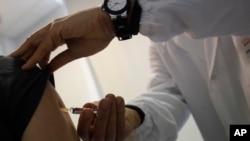The World Health Organization warns complacency and misinformation linking the measles vaccine to dangerous side effects have seen the highest number of measles cases and deaths in the European region in a decade.
The World Health Organization reports more than 41,000 children and adults in the European region have been infected with measles in the first six months of this year, including 37 deaths. This is a dramatic increase from 2016 when fewer than 5,300 cases of this killer disease were reported, the lowest number in a decade.
Mark Muscat is technical officer for Vaccine Preventable Diseases in WHO’s regional office for Europe. He tells VOA one of the main factors accounting for this sharp rise in infections is complacency. He says the measles vaccine has been so successful in preventing the spread of this killer disease, many parents do not feel the need to vaccinate their children.
He says the fear of side effects also discourages many people from vaccinating their children. For example, he notes great damage has been caused by a now debunked 1998 study linking the measles, mumps and rubella vaccine to autism.
“Unfortunately, that monster still has its legs and still goes around," he said. "It has been ingrained in the mentality of some people linking the measles vaccine with autism and so on. And, that is actually in a lot of peoples’ minds. This is all misinformation. That study has been retracted. It is not a valid study and people should not make up their minds based on that study.”
Seven European countries — France, Georgia, Greece, Italy, Russia, Serbia and Ukraine — report more than one thousand infections in children and adults this year. Ukraine, with over 23,000 measles cases, is the hardest hit. Serbia reports the highest number of deaths — 14 out of Europe's 37 fatalities.
Measles is extremely contagious and a major killer of children. To prevent outbreaks, WHO says at least 95-percent immunization coverage with two doses of measles-containing vaccine is needed every year in every community.




